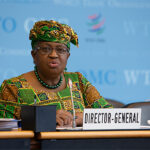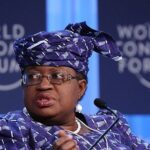The World Trade Organization (WTO) rule-maker for the global trading system which started life on the 1st of January 1995, has just had its glass ceiling shattered, with the first woman climbing to the apex of its structure. To add to the significance of the first, the woman in question, Dr. Ngozi Okonjo-Iweala, Nigeria’s former two-time finance minister and foreign minister is the first of African descent to be appointed to oversee the rules of the world trading system. Though she has recently acquired American citizenship, having studied, worked, and lived in the United States of America for nearly past four decades, she is strongly rooted in Africa where she was born 66 years ago and had her early education.
The world trade organisation is a critical fabric of the international system since the emergence of the post-world war II international order. Its predecessor was the General Agreement on Tariffs and Trade (GATT) which since 1948 when it was founded provided the rules for the world trade system. Though GATT mainly dealt with trade in goods, the mandate of the WTO and its agreements now, cover more comprehensively services and trade in inventions, creations and designs, (intellectual property).
- Zamfara Teacher Narrates How Angry Parents Vandalised School After kidnap
- Zamfara Govt: We Don’t Know The Number Of Abducted Schoolgirls
The various negotiations including the legendary Uruguay and the Doha Rounds, which culminated in the formation of the World Trade Organisation, were critical roadmap in establishing the infrastructure of contemporary global trading architecture.
It is the making of this complex web of trading rules, especially at a time when trade has emerged as the life-blood of the international system that Dr. Okonjo-Iweala would be stepping into the leadership of the world trading body of more than 150 countries.
Dr. Iweala who had a 25-year career at the World Bank in Washington D.C as a development economist is no stranger to multilateralism.
Rising to the number two position in the bank as managing director, she had the responsibility to oversee the World Bank $81 billion operational portfolio in Africa, South Asia, Europe and central Asia.
Mrs. Okonjo-Iweala, who was first appointed as Nigeria’s minister of finance in the late 1990s, over-saw negotiations with the Paris club that culminated in the wiping out of 30 billion U.S dollars of Nigeria debt, after paying a whopping 12 billion U.S dollars at once to the creditors.
She had argued that paying the debt would free the country of the burden of interest payments which according to her would free funds for addressing the country’s huge infrastructure deficit. Critics of the huge payment which she engineered with the huge 12 billion U.S dollar payment, insist that after the debt repayment and cancellation, there was nothing of substance that happened in the improvement of the country’s infrastructure to justify massive capital flight, the only one of its kind from a developing country in all history of international credit.
However, she made enormous efforts to improve Nigeria’s macroeconomic management, which included among others, the implementation of an oil price based fiscal system, where revenues accruing above reference benchmark oil price were saved in a special account, called “the Excess Crude Account,” which helped to reduce macroeconomic volatility. She also instituted a key transparency governance measure, whereby each of the local or state monthly financial allocation from the federal government of Nigeria were published in the Newspapers. In 2011, under another President, Mr. Jonathan Goodluck, she was reappointed as minister of finance with the expanded portfolio of the coordinating minister for the Economy which is well acknowledged to have brought considerable stability in the macro-economic management and even oversaw the rebasing of the country’s economy, which saw it as the largest economy in Africa.
Nonetheless, she comes to the apex of the world’s trade ruling making body with lot of experiences and broad international exposure that will serve her well in navigating through the negotiating crucibles that would stabilise the international trading system. In the era of multilateralism with isolated pockets of threats to it, she would have to marshal all compelling reasons on why free and fair trade is in the best interest of all.
With the China-U.S trade impasse, mostly stoked by Washington, she must weigh in, to enhance impartial mechanism for trade-dispute resolution that does not pander to hegemonic power designs.
As trade in goods has evolved to complex web of trading beyond goods only to intellectual property, the WTO under the director-generalship of Dr, Ngozi Okonjo-Iweala must up its game to point in the direction of a fair and equitable trading system that leaves no member state behind.
Though, bilateral trading agreements remains as the key component of the contemporary international system, the WTO would remain the guarantor and rule maker and the last port of call in dispute-resolution over international trade matters and therefore, has enormous responsibility to provide the enabling roadmap in sustaining one of human’s key activities that easily replace the thought of war, that has twice plunged humanity into the agonizing depth of bestiality.
An accomplished African woman, long dedicated to international public service, reflecting the reality saw much earlier by the revered Chinese leader Mao Zedong who asserted that “women hold up half the sky,” beyond the razzmatazz of contemporary feminism, Dr. Ngozi Okonjo-Iweala is enjoined to use her new office to advance the objective trajectory of the human prospects which clearly converge around the construction of a community of shared future for all humanity. Trade is one of the oldest human activities and must now be given to a prime place in the restoration of the common humanity of all mankind. This is the clarion call for Dr. Ngozi Okonjo-Iweala for which she must give considerable thought beyond the allure of office.
Mr Charles Onunaiju is director, Centre for China Studies, Abuja Nigeria.

 Join Daily Trust WhatsApp Community For Quick Access To News and Happenings Around You.
Join Daily Trust WhatsApp Community For Quick Access To News and Happenings Around You.


